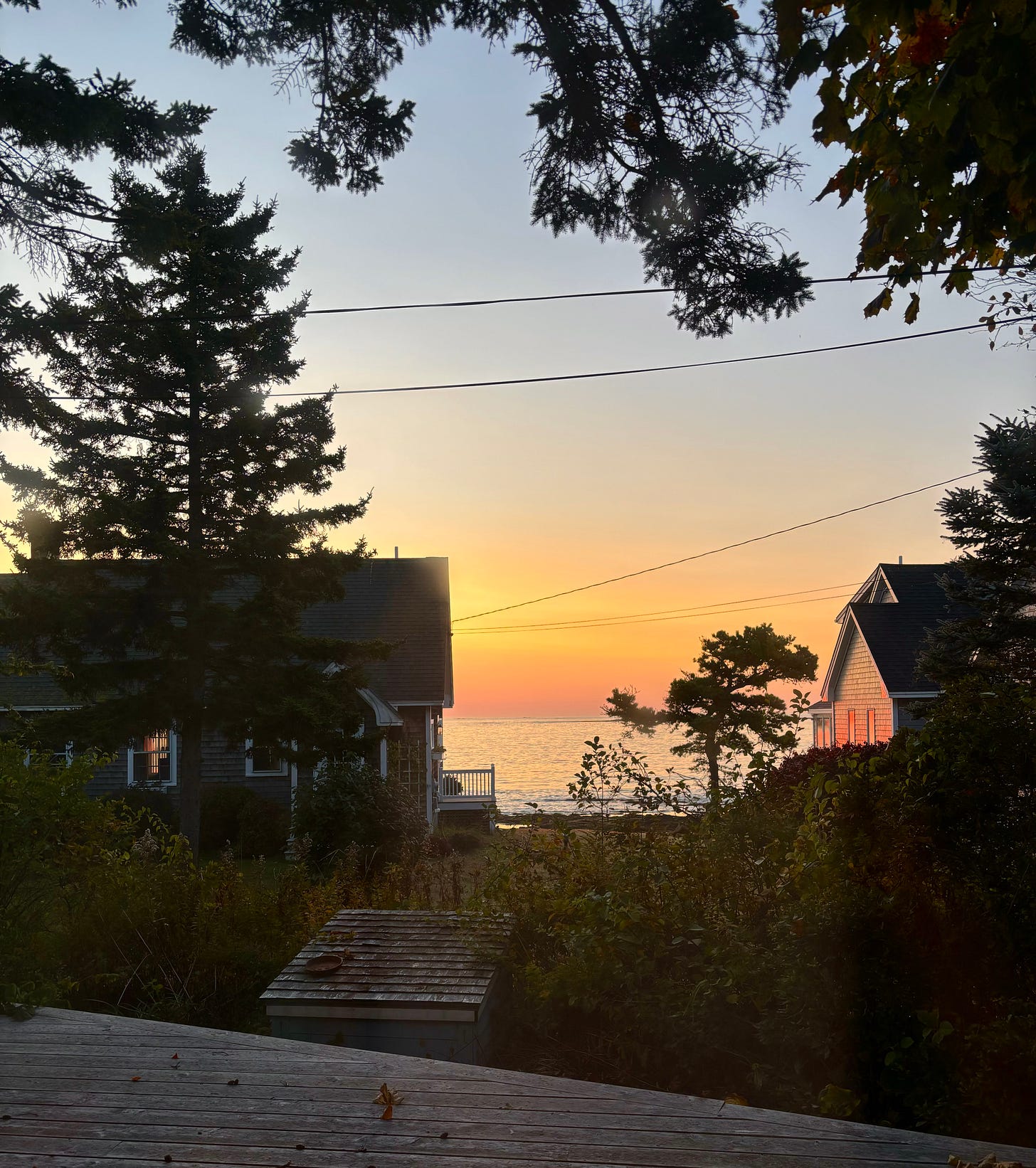What does it mean to accept yourself unconditionally?
And how do you divorce that from productivity culture?
I took myself on a mini retreat two weekends ago. After an event in Boston on a Thursday night, I drove up to Maine on Friday.
I’ve been craving time and space to work on a writing project that I started two years ago. I had written a flurry of words in November 2022 but those words have just been sitting on my computer since then. I opened up the file every once in a while and tinkered with them. But the longer I went without writing, the more the voices of my characters settled down. It was harder to hear what they were saying and what they wanted to do.
Over the last couple of weeks, I started working on it again in earnest. Not a lot but more consistently. A few hundred words here and there before work. But I could start hearing my characters again. I missed them. I wanted dedicated time to spend with them.
And if I’m being honest, I really really wanted to finish a draft of whatever this thing is. That was the whole reason I started this in the first place. It was purely an intellectual exercise, to see what happens when I commit to a project like this, when I make space for writing to be playful again. To see if I could actually write a full story, from beginning to end.
(Ha! I wrote that post 2 years ago and reposted it last year and I still haven’t figured out the ending.)
So it sounded like a perfect solution and I had it all planned out in my head. Run along the Charles River before hitting the road. Hole away for three days. Go for walks/runs and maybe a hike. Look at the ocean. Read. And most importantly, write. It was a perfect New England weekend too.
What I didn’t account for was the driving. That mid-coast Maine is still about 2.5 hours from Boston. That I would essentially be in the car all day on Sunday driving home to Brooklyn. (Almost 9 hours to be exact. Thank God for audiobooks!)
In the end, it left me with about a day and a half away, half the amount of time I planned on. I mentally kicked myself for not thinking this through better, that this was all a waste of time. While I’m not shy about taking time for myself and prioritizing the things I care about, still, I still feel like it has to be “worth it” when I do things like this, especially when it takes me away from my family.
But “worth it” has often equated with productivity culture—how time spent measures up in some arbitrary way, whether that’s seeing all the sites and museums on a trip, writing several thousand words, or blasting through a lengthy to do list. Otherwise, what else do I have to show for myself? And by those measures, writing 2000 words over a weekend isn’t much.


Last week, I was reading Devin Kelly’s article about Dathan Ritzenhein, the head coach of On Athletic Club. (It’s a really good article and you should read it). I came across the term Unconditional Positive Regard, which was popularized by psychologist Carl Rogers. In very basic terms, it means accepting and supporting someone regardless of what they do or say, that there are no terms or conditions on accepting someone.
Devin describes it as:
“The idea is simple: you want to create space for people to express their fullest selves so that they feel safe enough to grow, change, and explore who they are. It’s about both trust and belief. You have to create a space of belief in a person—and not just part of a person, but the full extent of a person, the beauty and the baggage—so that they trust you enough to grow in your presence.”
He talks about how this perspective is at the heart of Ritzenhein’s approach as a coach, the way that he sees his athletes as full humans and not just athletes and splits and race results.
When I got to this part of the article, I stopped and read it a couple of times because it felt radical in some way. Because I’m not sure I’ve ever had someone hold space for me in that way? I mean, sure there are a few friends and there have been a handful of people like teachers, summer program counselors, and writing retreat leaders who have held space like this but not in a longer term way that sustains that growth. Does that make sense?
This is veering on woo-woo territory even for me but I’m realizing that I need to be able to create and hold this space for myself too. To unconditionally accept and support myself, no matter what.
But how do you create the conditions you need to express your fullest self? And how do you divorce that from productivity culture?
It’s something that I’ve been working on with my therapist, to really figure out what it is that I want, not what I think my kids or family or other people in my life want. Because, as a people-pleaser, I will default to meeting other people’s need over my own and I will inevitably push down all my wants to the point where I’m not even sure I recognize them anymore.
I don’t have all (any?) answers but I do know that I need more space for play, for not always working towards some specific goal. Because when I’m working off a strict to-do list or plan, there’s so much noise in my head that it’s hard to hear my own voice.
I don’t always love writing, especially since my job involves so.much.writing (and that probably explains my more sporadic writing schedule here!) but I do need things that are just for me. And working on this project—whatever it may be—is fun and frustrating and scary but mostly fun. Part of it is also making room for myself so that I can stretch into the full extent of me as a human, to allow myself to grow. And I know that has a lot to do with starting with myself, trusting and believing in myself.
Of course the weekend wasn’t a waste, even the 9 hour drive home. Because I’m realizing that it’s OK to ask for and make space for myself and for the things that make me feel whole, no matter the outcome.
Links & Things
I felt this post in my bones. I used to love cooking. I really don’t anymore.
As a parent of 2 teenagers, one who’s off to college next year, I’ve been thinking a lot about how we set up our kids and whether we’re doing enough. If they’re “too soft.” And this piece really gets at so many of feelings about work ethic and what that even means.
Molly Seidel and Jonathan Levitt hit so many topics in this conversation, from injuries and eating disorders (and how you navigate that when your body is so tied to your career) to pursuing goals even though you know there’s a high likelihood that it will break your heart to athlete identity.
I listened to My Oxford Year by Julia Whelan recently. It was heartbreaking and really lovely (and I would listen to anything Julia Whelan narrates). It brought me right back to my obsession with the idea of Oxford, which I blame on the 1984 movie Oxford Blues with Rob Lowe. (It’s terrible and cheesy in all the ways that 80s movies are.)
AND, it’s the most wonderful time of the year in New York City—it’s NYC Marathon week! It’s hard to describe the energy on the streets and in the neighborhoods on Marathon Sunday. There are so many good athletes on the women’s side. I can’t wait to see if Hellen Obiri can defend her NYCM title and pull off another Boston-NYCM win in the same calendar year. (She won both races in 2023, becoming the first woman to do that in 34 years.) Super excited to cheer on Dakotah Lindwurm too, who’s coming off a 12th place finish at the Paris Olympics.
Thanks for being here. More soon.
Christine






I really liked this piece! One thing I am actively working on is separating my worth from my productively, as well as reframing what productivity means to me. I think that we have a cultural definition that hangs over everyone and serves as a sort of metric, but when applying the positive regard theory, I think we can adjust our understanding of productivity and see we’re all doing more than we think, especially when we work to grow in a positive way!
Wow. Lots to ponder in your musings on productivity. I think the concept of “being productive” is entrenched in our culture. I remember my dad, when he saw me just “hanging out” as a teenager on a weekend, would comment on me “not being productive.” I took that criticism to heart, caring more what he (and others) perceived, rather than listening to my inner voice.
Learning to find that still, small voice amidst the din of outside influences is hard and something that I continue to cultivate. For me, carving out time to day dream, be outside in nature, or playing the piano helps draw my attention inward. The trick, though, is to make that time for yourself as valued and non-negotiable an activity fit into the rest of your daily commitments. Once you do, you begin to find a flow and others around you begin to notice, appreciate, and understand how vital that time is. And perhaps, they, too, will begin to seek out that space to find, explore, and listen to their own still small voice.